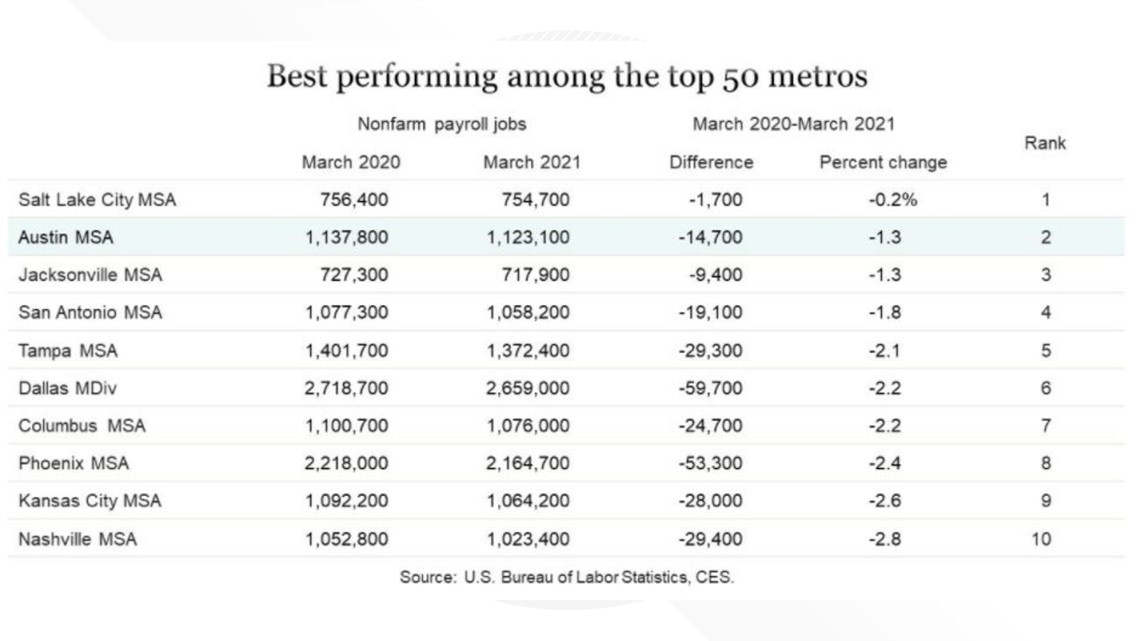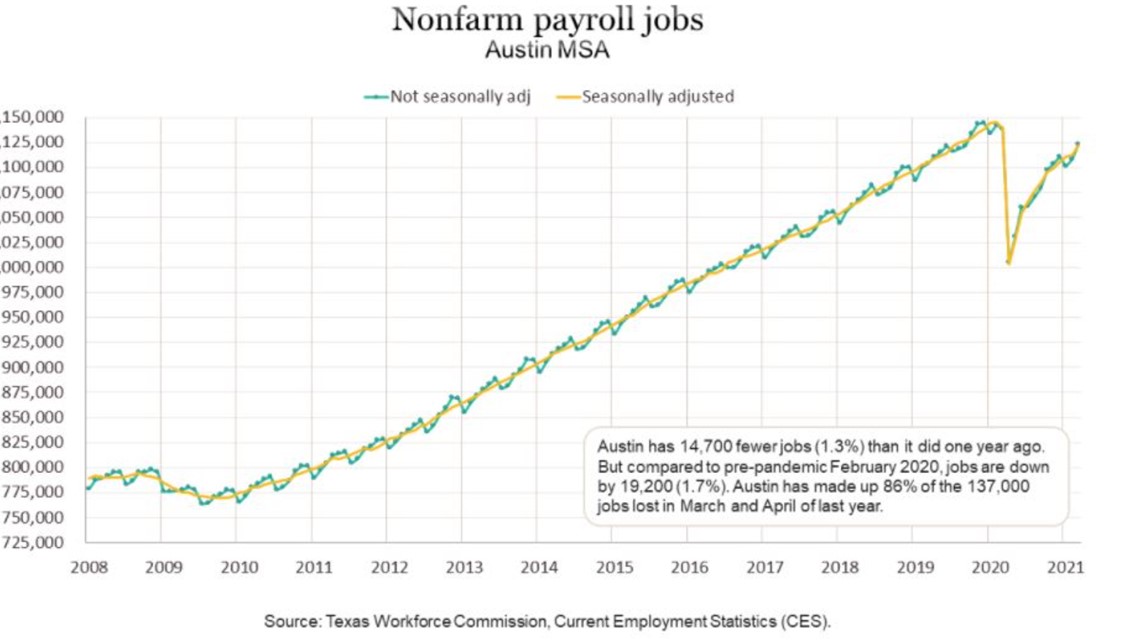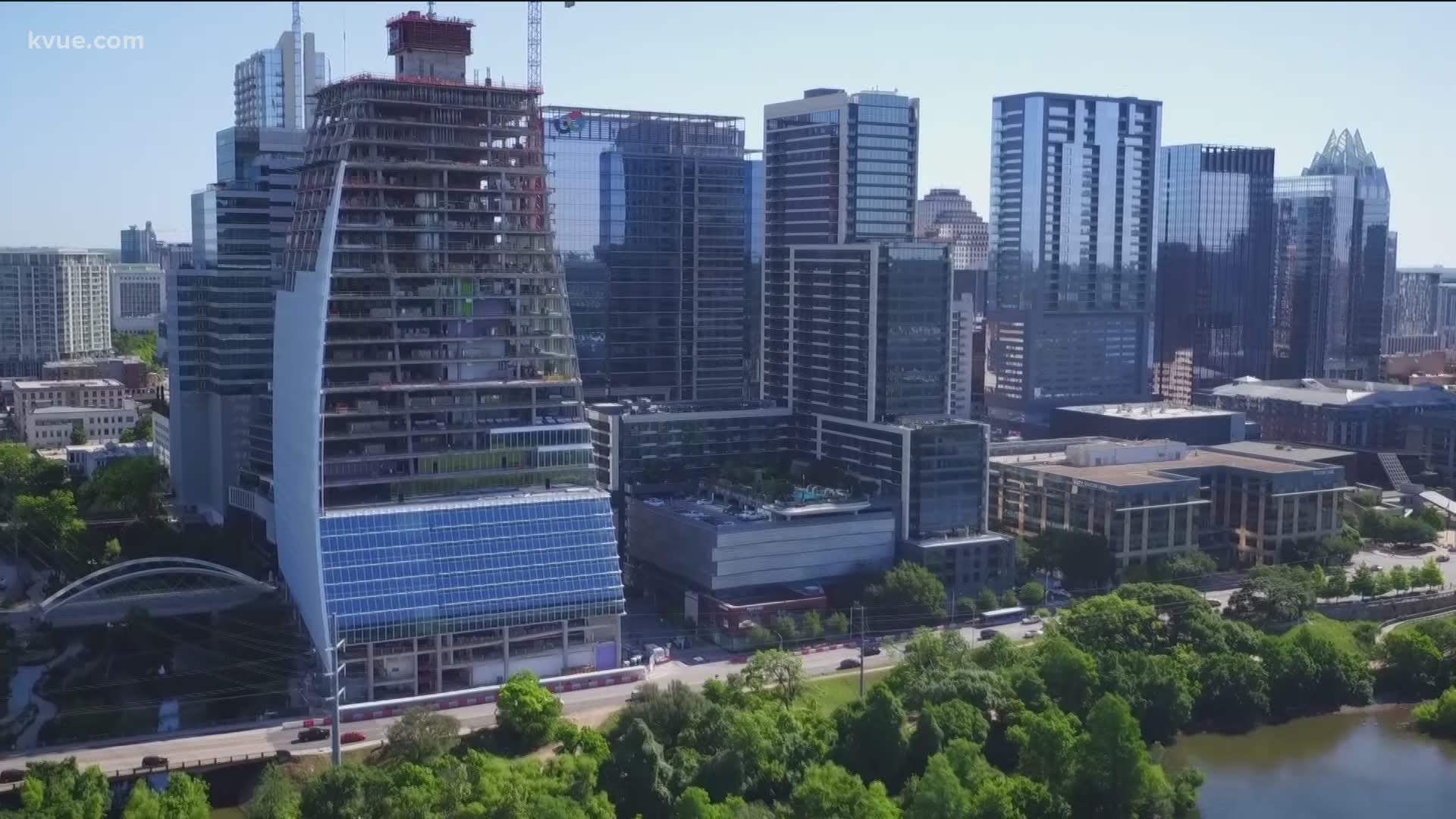AUSTIN, Texas — The landscape of life has changed a lot for many of us this past year. When his family's California business was forced to close during COVID-19, Chris Phillips came back home to Texas.
“It's just a different world out here, which made it easier to just do a whole new business from scratch,” Phillips said.
Phillips and his wife dug right in and started Phillips Skid Steering in Leander.
“We focus on gravel driveways and dirt work,” said Phillips.
Building a rock solid foundation during a pandemic would seem tough, but Phillips said the suburbs of Austin proved to be the perfect place for a fresh start.
“It's always right off the bat with everyone we've met, they want to connect us with the next connection point so that we'll succeed,” Phillips told KVUE.
During the pandemic, that trend really worked, especially in the suburbs. More people were working and staying close to home, so they spent their money close to home.
“As a whole, our business community has done really, really well. As the numbers show,” said Leander Chamber of Commerce President Bridget Brandt. “It is the very best result of a stay local, shop at home campaign, because that's what's happened."
Record growth
Growth explains a lot. Leander is the fastest-growing suburb in the country and it is flourishing. Last year, the city gained nearly 100 businesses. Last year was also a record year for Austin, with 154 companies announcing plans to either relocate or expand here.
“We saw a lot of growth within Austin and also in areas surrounding Austin. So what that tells you is that as a region, we are a hotspot," said Austin Chamber of Commerce president Laura Huffman. "And by the way, I think that's one of the reasons why this region is usually the last in and the first out of an economic downturn. And that is once again proving to be true with the pandemic."
86% of job losses regained
Austin has experienced a year-over-year decline in jobs of 1.3% or 14,700 jobs. Yet, it is the second-best performing among the 50 largest metro areas.
Austin beat out San Antonio and Dallas (both ranked in the top 10), Fort Worth (3.3%, 13th ranked) and Houston (5.5% and 26th ranked). And Austin has now regained 86% of last spring's pandemic-related job losses.


The KVUE Defenders dug through sales tax revenue data from May 2019 to 2021 and found every city across Central Texas lost businesses in 2020. Since then, they have bounced back, regaining even more than they lost.


There are some areas where businesses are still suffering. For example, Austin has yet to regain all of the restaurants it lost, but the suburbs saw more restaurants opening up or relocating there.
Suburbs gaining even more
Texas Taco Kitchen opened up on March 11, 2020, in Liberty Hill.
“We opened up eight days before everything shut down. I call it my eight days of greatness. We were just off the wall for the first eight days. And then COVID hit and everything just went screeching down,” said Jordan Melchor, owner of Texas Taco Kitchen.
Melchor's family sold their Austin-based barbecue franchise in 2019. Then, in 2020, Melchor decided to open his own scratch kitchen. Once COVID hit, he added curbside pickup and family meals to help keep the business going. It worked ... those family meals now make up 40% of their sales.
“My personal experience of the pandemic ... people really jumped on board with business. They really wanted to see local business succeed,” Melchor told KVUE.
Sales tax revenues climbing
We're seeing that across the state. The KVUE Defenders have been looking at sales tax revenue data for the last year.
There is about a two-month lag in tax collections, but the latest figures from the Texas Comptroller show the state collected nearly 22% more in May 2021 than May 2020.
The biggest gains are in online shopping and the food industry. Combined, 10 Central Texas cities (Austin, Buda, Cedar Park, Dripping Springs, Georgetown, Lakeway, Leander, Liberty Hill, Pflugerville and Round Rock) gained 1,422 online businesses and 226 more restaurants in the last year.
- Austin: 959 businesses gained (3.9%), 1,744 businesses lost (6.8%)
- Buda: 452 businesses gained (16.1%), 196 businesses lost (7%)
- Cedar Park: 226 businesses gained (3.9%), 812 businesses lost (14%)
- Dripping Springs: 232 businesses gained (11.2%), 241 businesses lost (11.6%)
- Georgetown: 426 businesses gained (7.5%), 575 businesses lost (10.1%)
- Lakeway: 205 businesses gained (7.4%), 363 businesses lost (13.2%)
- Leander: 489 businesses gained (11.7%), 540 businesses lost (13%)
- Liberty Hill: 243 businesses gained (16.7%), 540 businesses lost (13%)
- Pflugerville: 236 businesses gained (5.1%), 694 businesses lost (14.9%)
- Round Rock: 235 businesses gained (3.1%), 809 businesses lost (10.7%)
“If you look at the data, you can see that sales tax is coming back throughout the state. If you look specifically at the last couple of months, you see that sales taxes really on the upswing. And that's an indication that businesses are starting to boom because people are getting out more,” said Huffman.
“We've added like 97 businesses during COVID, which almost a hundred businesses during a pandemic ... that's pretty incredible. That's an incredible result on its own, but in addition to that, the number of businesses that we already have that are expanding, that's also pretty incredible. So it's exciting,” said Brandt.
These are signs that Central Texas is working its way back to the booming status that has long made this area attractive.
PEOPLE ARE ALSO READING:

